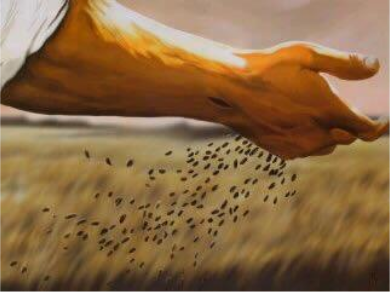The Sower
Matthew 13:1–9 (see also Mark 4:3–9, Luke 8:5–8)
And in that same day, Jesus, going out from the house, sat by the sea. And many crowds gathered together to Him, so that stepping into a ship, He sat; and all the crowds stood on the shore.
And He spoke to them many things in parables, saying, Behold, there went out a sower to sow; and in his sowing, some seeds indeed fell along the way, and the birds came, and devoured them. And other fell on rocky places, where it had not much earth, and straightway it sprang up, on account of not having depth of earth; and when the sun rose, it was scorched; and because it had no root, it withered away. And others fell among thorns, and the thorns sprang up, and choked them. But others fell on the good earth, and gave fruit, indeed some a hundred, and some sixty, and some thirty.
He who has ears to hear, let him hear.
Different kinds of ground
Doctrine of Life 90. It is the truth that is meant by the “seed [sown] in the field” ... Here the “sower” is the Lord, and the “seed” is His Word, thus the truth. The “seed upon the way” exists with those who do not care for the truth. The “seed upon stony places” exists with those who do care for the truth, but not for its own sake, thus not interiorly. The “seed in the midst of thorns” exists with those who are in the lusts of evil. But the “seed on the good earth” exists with those who love the truths that are in the Word from the Lord, and do them from Him, thus who bear fruit. That these things are meant is evident from the explication of the parable by the Lord (Matt. 13:19–23, 37; Mark 4:14–20; Luke 8:11–15). From all this it is evident that the truth of the Word cannot take root in those who do not care for the truth, nor in those who love the truth outwardly and not inwardly, nor in those who are in the lusts of evil, but in those in whom the lusts of evil have been dispersed by the Lord. In these the “seed”—that is, the truth—takes root in their spiritual mind.
AC 1940.3. Unless the rational submits itself to the Lord’s goods and truths, it either suffocates, or rejects, or perverts the things that flow in; and this is still more the case when they flow into the sensuous knowledges of the memory. This is what is meant by seed falling on a highway, or upon a rocky place, or among thorns, as the Lord teaches (Matt. 13:3–7; Mark 4:3–7; Luke 8:5–7). But when the rational submits itself and believes the Lord, that is, His Word, the rational is then like good ground or earth, into which the seed falls and bears much fruit.
DMin 4637. Concerning charity towards the neighbor.
When holiness and good descends from the Lord, through angels, into man and the delight of his life, then it is like a seed hidden in the ground. If the delight be pride, or the love of self, then it falls into evil ground, where there are thorns. So, also, if it falls into that delight of man which is the lust of gain. Wherefore, such ground is regarded by the angels as something sterile, foul and excrementitious, into which nothing good can sink down, because it is swallowed up by evils. But if good and holiness from the Lord fall into the delight of charity, into the affection of justice and rectitude, and into contempt of gain and honor except for the sake of use, then it falls into good ground and bears much fruit.
Affection itself is the ground, whose quality is not perceptible in any other way than from the delight of the man. There is the best ground, if the affection is of charity; and, also, if the charity is of faith in the Lord. The worst ground is the delight of honor and dignity not for the sake of use; and next, the delight of riches not for the sake of use. As is the quality of the use, such is the delight.
Birds devouring the seed
AC 5149.6. “Birds” [here] denote reasonings, and also falsities.
Rocky soil, earth and sun
AE 401.35. “Seeds” signify the truths from the Word, that is, the truths man receives from the Lord, for it is afterwards said, that it is “the Son of man who sows.” “Rocky places” signify a historical faith, which is another’s faith in oneself, which is believing a thing to be true, not because one sees it in himself, but because another in whom he has confidence has said it. “Earth” signifies spiritual good, because this receives truths as soil does seeds. “The sun’s rising” signifies the love of self, and “to be scorched” and “to wither away” signify to be adulterated and to perish.
This makes clear what is signified by these words of the Lord in series, namely, that the truths that are implanted from infancy from the Word or from preaching, when man begins to think from himself, are adulterated and perish by lusts from the love of self.
Questions and Comments
- The seed is the Lord’s Word. What good habits can we adopt to make sure we are continually receiving it?
- AC 1940.3. teaches that the good ground is like the rational that “submits itself and believes the Lord, that is, His Word.” What does it mean for us to submit our rational like this?
- DMin 4637 explains that affection is the good ground. What do you think this means? And how can it help us to be good ground?
- What is a specific falsity that can devour seeds of truth like the birds in the parable?
| previous |  |
next |
|---|


